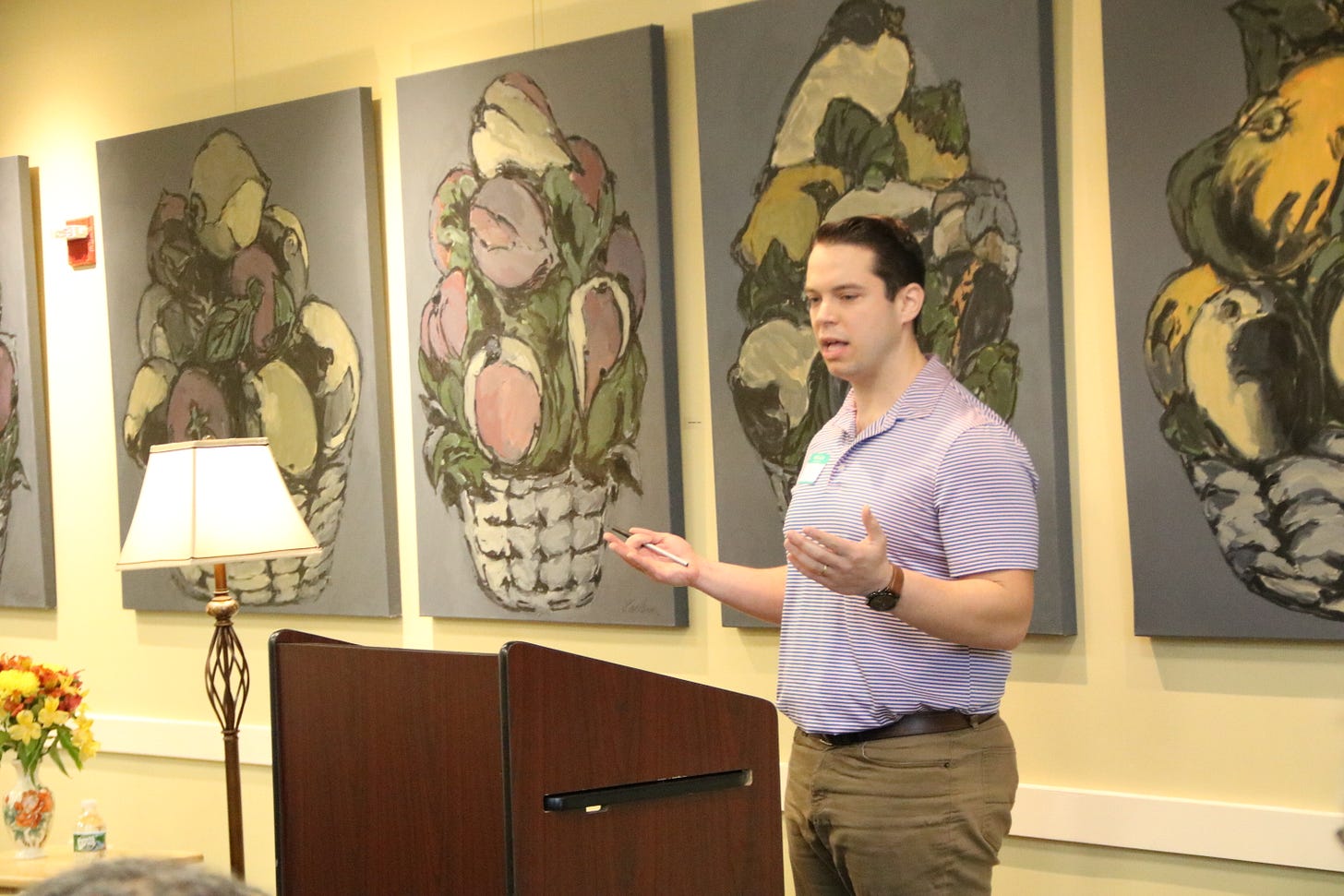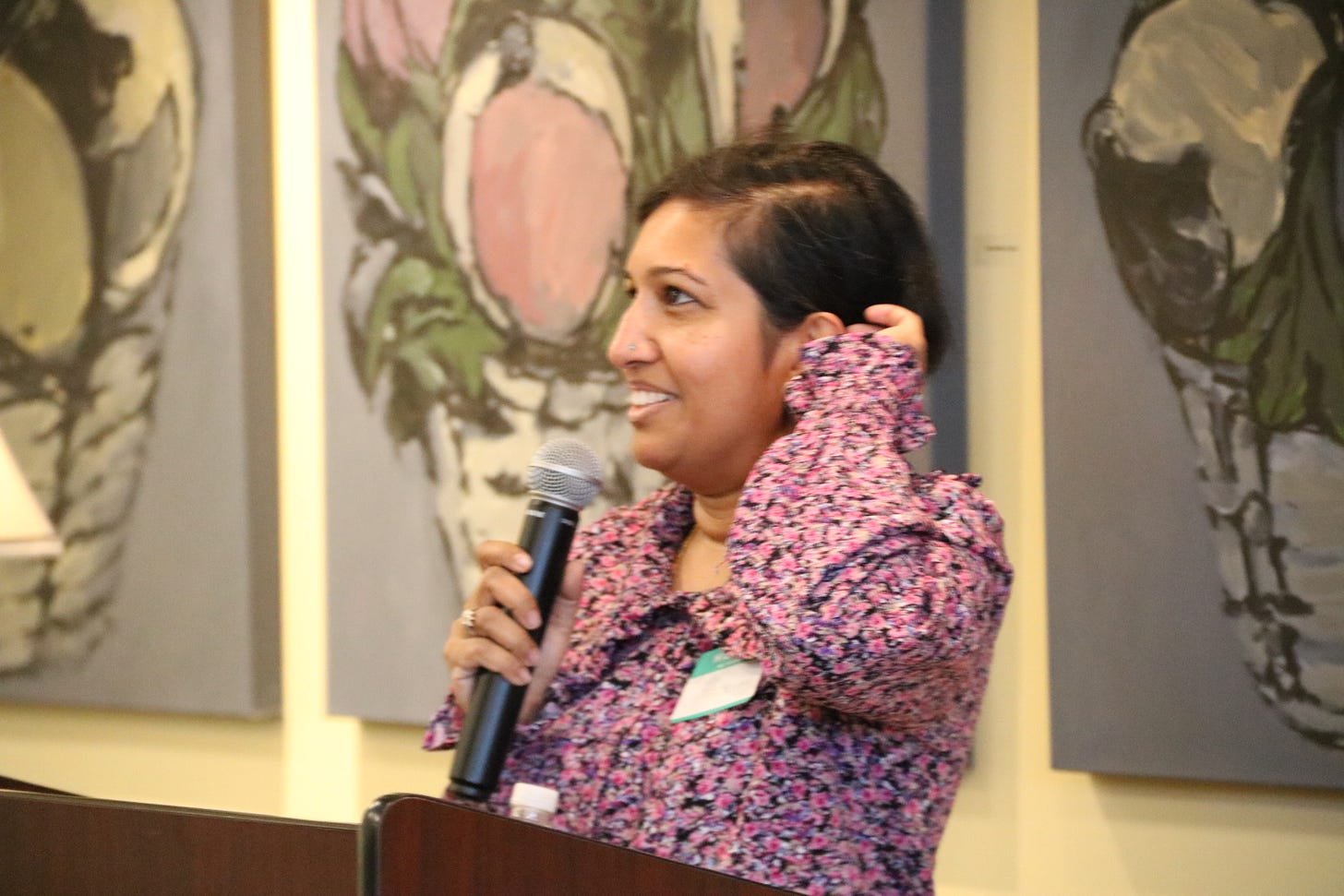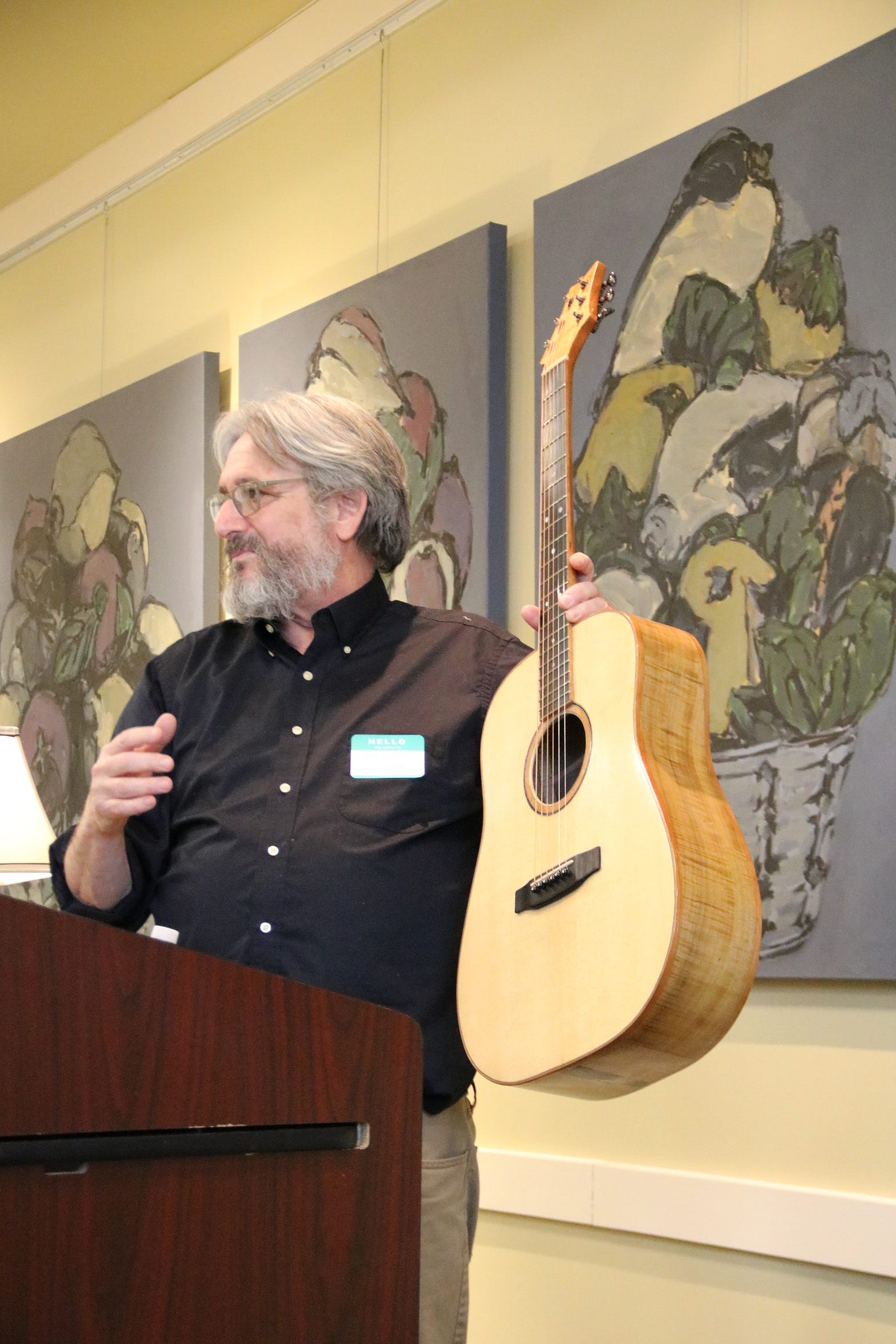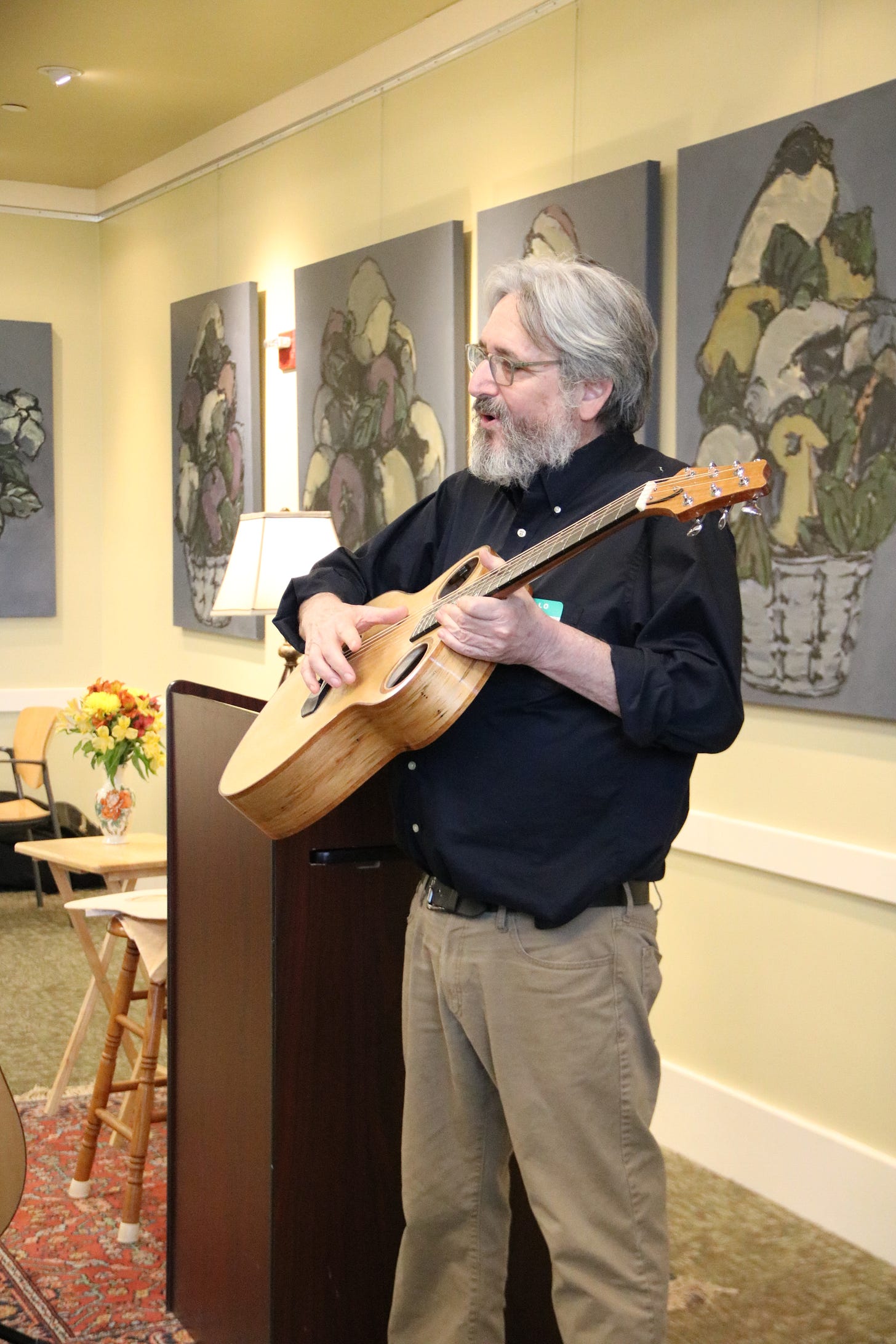What Three Warwickians Do and Why
Three local people explained the work they do and the story behind their choices.

Cooking up community with ethnic food, crafting guitars and relieving pain–three Warwickians discussed their vocation or avocation at “A Day in the Life,” an event at Albert Wisner Public Library on Saturday morning. Beverly Braxton and We the People Warwick, the group she founded to catalyze community building, organized the gathering, which drew 40 people.
Conceived by Mary Makofske, of WTPW, the event offered insight into the lives of a few local people as a way to help bridge divides that have grown to crater size among community members, catalyzed by pandemic and politics, as reflected in surveys and soaring mental health issues.
“Five minutes telling your story in the community is not a lot to lead to important change,” said Braxton. “And it changes you. You learn about yourself, and it builds curiosity. People notice what they’re connected to in each other.”
“A Day in the Life,” had been tried once before with an enthusiastic reception, several attendees reported. Each presenter speaks for ten minutes about their work and how they chose it and then takes questions, followed by mingling and refreshments.
An athletic trainer addresses pain
First to speak was Nick Clark, an athletic trainer. He recalled how his bodily awareness and ambitions evolved from his Staten Island childhood, marked by video games and snacks that gave him his initial plumpness. Then a move upstate was jarring.
“What were those cows doing there?” he laughed.
As eighth grade dawned, Carter became more concerned about how he was sized up by his peers, especially girls.
“Weights became my new obsession,” he said, resulting in surprising muscles. “But when my friend’s mom told me we were going to football practice, I was more nervous than I am now, speaking to a crowd.”
His success in football led to his interest in athletic training and ways to alleviate pain with movement and alignment, methods that looked more appealing as he watched his father fall into opiate addiction for pain relief. Eventually he surrendered to inpatient treatment.
“Injections, manipulations and surgery aren’t bad, but they’re not the solution,” Carter said.
Mary Makofske, one of several with questions, asked about self care for those who sit for hours at a computer. Carter advised taking a break every 25 minutes, which he admitted he doesn’t do, once steeped in a task. So he suggested deep breaths with ribcage down.
Making food a community hub
Next to speak was Anbu Vasudevan, who came to Warwick from much further away. She describes herself as “ethnically Indian,” although she grew up in Malaysia, among Malay and Chinese people, near Thailand. Her family is originally from India, but she is third generation Malaysian and grew up amid assorted languages and cultures. She speaks five languages and cooks an array of flavors.
“The day I landed in America, I cooked that night,” she said of arriving at the age of 22, 24 years ago, homesick for the ethnic “fusion” cooking that she grew up eating.
“I crave those foods, so I must make them,” she said.
That compulsion led to a profession 12 years after her divorce.
“I was left with the children, and I wanted financial independence. I didn’t want to struggle,” she said.
So two years ago she started a catering business, Meals by Anbu, offering Southeast Asian, Indian and Middle Eastern food. This week online, she offers Middle Eastern dishes for the Baha'i and Persian new year. If ordered by Thursday, the meal can be picked up on Friday.
But when Vasudevan began, detractors erupted online: “How dare you do that!” they wrote. They accused her of lacking licensing and health department certification, all of which she has.
“But there’s such a need,” said Makofske.
“I want to make a community,” Vasudevan said, noting the importance of community and food in Malaysia.
Recently she began organizing sit-down dinners at a lodge. The next one will be in April with Thai and Vietnamese food and a noodle bar.
Asked how she learned to cook for so many, Vasudevan said that she had cooked large batches to last for days for her family, although a day and a half was usually as far as it went. So much cooking went on that her children also learned to cook. The youngest, late to develop in some ways, surprised her by flipping pancakes.
But when her children became teens, she said, “They didn’t connect me to others anymore,” unlike when they were smaller.
Loneliness and depression descended. So she summoned food to the rescue again. Recently, she held a tea and cake event to create a “vibrant community,” which she announced on Facebook. She was surprised when 25 people showed up for the occasion at Mountain Lake Park.
“Then I realized I needed an agenda,” she said.
She asked everyone what their vision of “vibrant community” was. Next time, on March 29, at 10 a.m., she plans to ask them how to make that community.
The audience asked questions and enthused about Vasudevan’s upcoming events, as she gave menu details.
Sounding boards: Making guitars
Where David Schiff lived also influenced his interests. He was working as a news reporter in New Jersey when he rented an apartment from a carpenter.
“He made things for the apartment, and I learned from him,” said Schiff.
This led to a job as a woodworker and as author and editor of how-to books. And then he encountered an eight-day guitar-making class and an online one, which resulted in Schiff making a guitar that drew $6000 worth of raffle tickets for Music for Humanity.
Then he began to fine-tune his guitar-making.
“Every tree is different. Growing in less light, grains are closer together,” he said. “I can listen to the wood as I carve.”
Because the venture is not profitable, he has also found ways to make the more expensive tools he needs and learns from his mistakes on each guitar, he says. He hasn’t sold a guitar but would like to custom-build an affordable guitar for a musician.
“I can adapt to the person, for example, to the size of their hands,” Schiff said.
Asked how long he spends making each guitar, he said, “If I knew, I probably wouldn’t do it.”
What’s next for WTPW: a second Mental Health Forum
The next We the People Warwick event will be their second Mental Health Forum, on April 29, focusing on what mental health challenges communities face, what resouces they have and what individuals can do “to help people feel connected,” Braxton said.
“We need to create normalcy around being better neighbors and normalize humanness, talking about emotions, well-being and the continuum of emotional well-being,” she said.
Community focused news can only succeed with community support. Please consider the various subscription levels.






